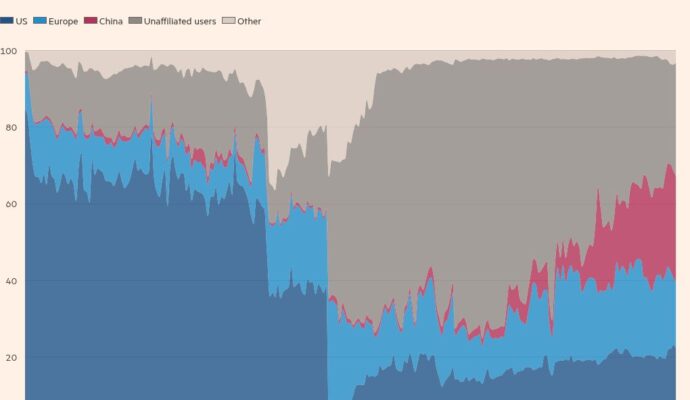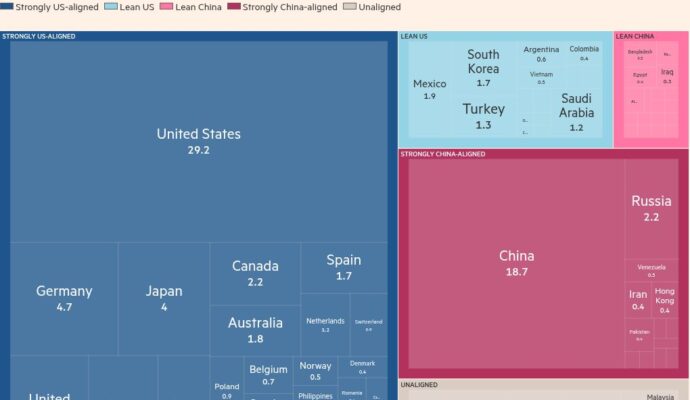Hours after Donald Trump threatened Beijing with “massive” tariffs on Friday over its export controls on rare earths, he appeared to put his words into action by imposing a 100 per cent levy on imports from China.
But the US president’s move hinted at a more calibrated approach than some had expected.
Instead of imposing the tariffs immediately, they will come into effect on November 1, two days after a scheduled meeting with President Xi Jinping. That suggested Trump was creating room for a solution even though he had said there was no point in meeting Xi at the Apec forum in South Korea.
Asked what would happen if China reversed the export controls, Trump said: “We’re gonna have to see what happens. That’s why I made it November 1.”
One former US official described his response as a “mega Taco”, using the acronym for “Trump always chickens out” — a phrase that came into vogue after backing down in the face of Chinese pressure.
“Xi will see it exactly for what it is: a clear indication of weakness, a lack of resolve, if not desperation,” he said.
The sweeping export controls had shocked the White House, partly because they came three weeks before Trump was expected to hold his first meeting with Xi since returning to the White House.
Early on Friday, Trump said he might cancel the meeting. Later he said: “I haven’t cancelled, but I don’t know that we’re gonna have it. But I’m gonna be there regardless, so I would assume we might have it.”
The new Chinese controls require foreign companies that export products with rare earths from China to get approval from Beijing. Combined with Trump’s response, they obliterated the trade ceasefire between the powers.
“Two huge heavyweights in the ring. I haven’t had so much fun since the Thrilla in Manila,” said a second former US official, referring to the 1975 boxing match in the Philippines between Muhammad Ali and Joe Frazier.
In his first comments about the issue, Trump had lashed out at China, describing the controls as “very hostile”. He said that, beyond tariffs, many other countermeasures were “under serious consideration”.
His reaction sparked hope among some China hawks in his administration, who have been frustrated that he has prevented them for taking tough security actions to avoid jeopardising the trade talks and the summit.
One US official said “Christmas has come early” for the China hawks.
Those hawks are hoping that China has angered Trump so much that he will allow them to start taking aggressive measures — just as he gave the green light for tough security actions against Beijing in 2020 after blaming China for Covid-19 when his handling of the pandemic came under criticism.
“The China hawks in the administration must feel vindicated as they have watched with dismay as Trump has taken a more conciliatory approach towards China in recent months,” said Wendy Cutler, vice-president of the Asia Society Policy Institute.
People familiar with the situation said the US was preparing a range of possible retaliatory actions, including sanctions on Chinese companies, new export controls, and putting Chinese groups on a trade blacklist.
Experts are debating whether China has overplayed its hand with the export controls, or whether Trump’s response is playing into Beijing’s hands.
Dennis Wilder, a former CIA China expert, said Trump was doing what Xi wanted — reacting emotionally.
“Trump is embarrassed and must protect himself from the hawks’ criticism,” Wilder said. “Xi had to know exactly how Trump would react. He has upped the ante in the great poker game. Does Trump fold or put his chips in?”
But others argued that China had misread the US. “This week’s export control expansion looks like a miscalculation. What Beijing sees as leverage, Washington sees as betrayal,” said Craig Singleton, a China expert at the Foundation for the Defense of Democracies.
John Moolenaar, the Republican chair of the House China committee, said China had “fired a loaded gun at the American economy”. He urged Congress to pass legislation to counter Beijing, including a bipartisan bill that would revoke China’s permanent normal trade relations status.
The first former US official said the key to what happens next between Beijing and Washington depended on how Xi reacted to Trump’s threat.
“The Chinese move has shattered everything. Xi is not going to say mea culpa,” he said. “His approach has been maximum engagement, zero concessions and asymmetrical strong retaliation.”
Nazak Nikakhtar, a trade lawyer at Wiley Rein, argued that China was unlikely to back down, particularly after watching US markets fall earlier this year when Trump imposed 145 per cent tariffs on its goods.
“Some think this is a negotiation, but they have got Xi all wrong,” said Nikakhtar, a commerce department official in Trump’s first term. “This time, China will not give in to the threats. And as Xi watches our markets go down, his position is that the US is shooting itself in the foot.”
But Wang Wen, a dean at China’s Renmin University, said the new tensions would be resolved through negotiations.
“China’s countermeasures . . . are advantageous and will ultimately lead to the US returning to the negotiation table,” said Wang.
“China has become accustomed to the ‘paper tiger’ behaviour of the US.”


